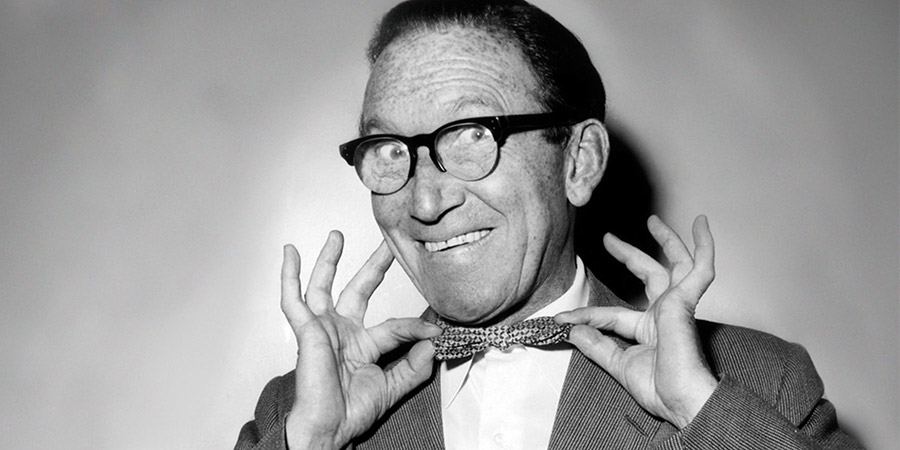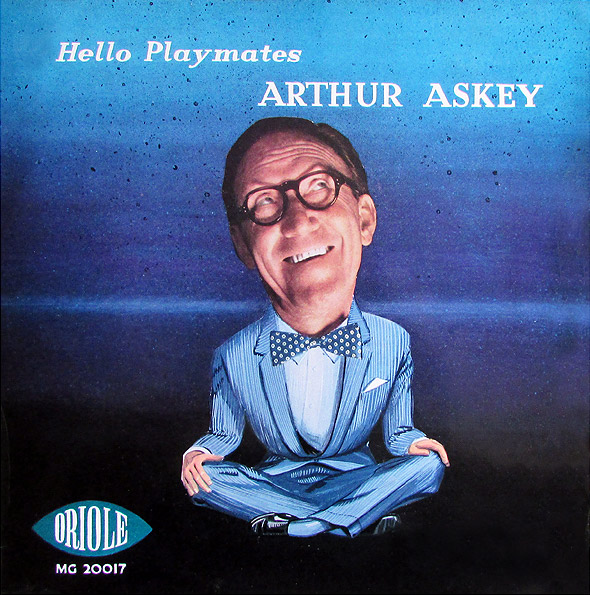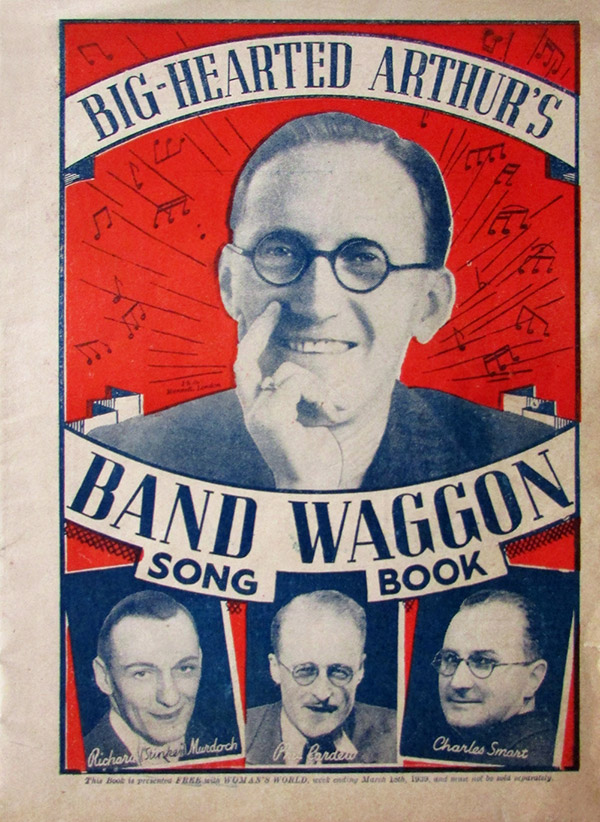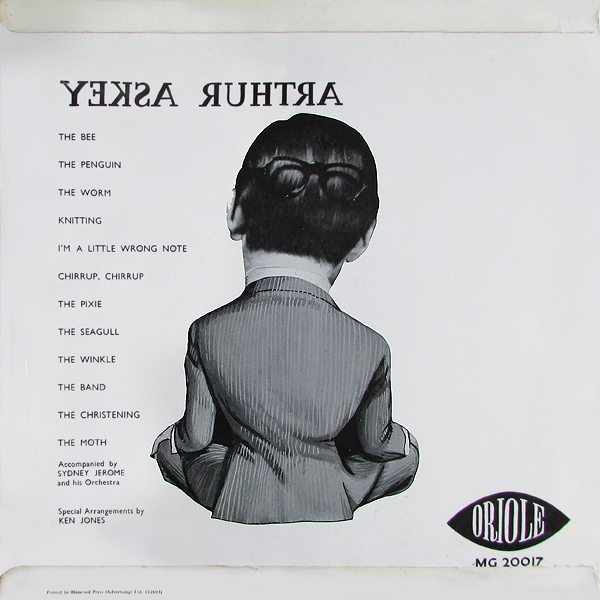
Arthur Askey - Hello Playmates (1957)

1957 - Arthur Askey
Hello Playmates
Oriole MG 20017
The Goons may have been the radical new comedians on the scene in the late-1950s, but the old guard were by no means stepping back gracefully and allowing them to take over without a fight. While the comedians who had first taken to performing during the Second World War were now ubiquitous on stage and screen, there were many veteran entertainers still working hard to keep the nation amused. Take for example Arthur Askey, a veteran performer even then, a busy little electric spark of a man, for whom a dozen synonyms for energetic still never seems to be enough.
Arthur Askey was born in Liverpool in 1900 and was an ebullient hyperactive show off from an early age. Raised on his aunt's nursery rhymes and his father's sentimental ballads, the young Arthur took to performing these treats at school, whether his classmates needed to hear them or not. He also became an enthusiastic chorister, and took part in numerous church concerts. It was always hard to contain Arthur Askey's ever-optimistic exuberance, even in those early days, and when the First World War broke out in 1914, the youthful Askey seized yet another opportunity. With his fellow Liverpool Institute school mate and future comedy legend Tommy Handley, he took to entertaining wounded troops, possibly compounding their suffering even more.
Leaving school aged 16, Askey started work in the education department of the Liverpool Corporation. With an expanded repertoire of songs cribbed from local music halls, Askey was growing in confidence on stage - albeit still as an eager, zealous amateur. As a young man, safe on the home front during a time of turmoil, with the prospects of a comfortable job for life, a generous pension and a hefty £10 a month salary, Askey could have been forgiven for forsaking his showbiz aspirations. The First World War and the British Army had other ideas however.
Standing only 5 feet 2 inches and short-sighted, Askey wasn't exactly typical soldiering material but by June 1918 the British war machine was running short of men. And so it was that after a medical examination that must have been as short as Arthur himself, Private A Askey was dressed in a khaki uniform two sizes too big for him and conscripted into the Welch Regiment. Posted to the Eastern Front (aka Great Yarmouth), Askey once again took to performing, winning army talent shows and annoying officers and conscripted men alike with his piano playing and silly songs.

On his return to civilian life and inspired by his time in the army, Askey started his own concert party and staged gigs in his spare time around the Liverpool area. Eventually in 1924 Arthur was offered a full time, thirty week tour with a professional concert party. The future star made his inauspicious professional debut later that year at the Electric Theatre, Colchester. The fine Edwardian building still stands, although is now a unisex hair salon. I like to think that a grinning photo of Arthur, with his sensible slicked back trim, is pinned to the wall for customers to contemplate while they enjoy a vigorous shampoo and set.
Askey worked steadily from then on, building up his act and his reputation, honing his skills with years of pantomime and summer seasons. Still endlessly touring, his big break was to come in 1937 in a show organised by the BBC for the coronation of King George VI. Initially a minor comic in the large cast of established film, stage, and radio stars, Askey was gifted a much larger role when Max Miller, dissatisfied with the script hampering his usual cheeky antics, pulled out of the show. Taking Max's place in a sketch with the veteran comedian and Prime Minister of Mirth, Sir George Robey, Arthur gradually had all his comic lines taken away from him by the formidable and stern older star. In an act of revenge that either makes or breaks an act, Arthur shamelessly ad-libbed and cavorted on the actual night of the performance, stealing the show from Robey in the process. Fearing a reprimand and censure by the BBC, instead Askey was offered a chance to star in his very own radio variety show, Band Waggon. Robey's thoughts on the matter are not recorded.
Despite its enduring reputation Band Waggon did not get off to a good start. Let down by poor scripts, the decision was taken to pull the show after just three episodes had been broadcast. With three more programmes still left to record, Arthur and his co-host Richard Murdoch were left to their own devices and took it upon themselves to save the show and reinvent it from scratch. It is fair to say they succeeded. Askey and Murdoch came up with the novel and somewhat surreal idea that the pair should actually live in Broadcasting House, in a sitcom setup that rankled with stuffy BBC bosses. There in their fictitious flat over the Director-General's office, the pair were waited on by their charlady Mrs Bagwash and her young daughter Nausea. Pet goats were introduced, pigeons arrived and guest stars ceased to be needed (the last to appear on the show was Cary Grant). Band Waggon won a reprieve and ran for a full season, gradually becoming ever more crazy and imaginative with each episode.

Perhaps the most important contribution Band Waggon made to Arthur Askey's long career were the multitude of catchphrases and nicknames that the two stars took to inserting in the scripts. Richard Murdoch became Dickie 'Stinker' Murdoch, while Askey became known as 'Big-Hearted' Arthur and the audience became their 'playmates'. Catchphrases such as 'doesn't it make you want to spit' became famous across the nation, and of course there was that hardy perennial 'aythangyou'. Used by Arthur instead of the much more common 'I thank you', it was a vernacular rendering apparently picked up by Askey from the chirpy patter of London bus conductors. Band Waggon with all its silliness and familiarity became an institution and a national obsession. That popularity saw the series turned into a major stage show by impresario Jack Hylton, a 1940 feature film that gave Askey his first starring role, and much later on adapted to become the TV series Living It Up. At the age of 38, Arthur Askey was at last a major star.
Like his fellow 1940s wartime contemporaries, George Formby, Will Hay and Tommy Trinder, Askey's talents were soon employed amusing the public with a succession of cheery films, and entertaining troops with tours and concert parties. The war years were a fertile time for comedians able to entertain a beleaguered public, and Arthur became a much loved and cherished national treasure. Unlike Formby, and Hay however, the end of the war did not mean an abrupt end to Arthur Askey's popularity. Indeed far from it. The new medium of television kept Askey in the public consciousness throughout the 1950s and into the '60s, with series such as Before Your Very Eyes (yet another catchphrase) and The Arthur Askey Show. In 1957, at possibly the height of his fame and popularity, Arthur took the decision to make his vinyl album debut with Hello Playmates, released on the independent record label Oriole.
The album draws on the many silly songs which Arthur had been singing in his act from his earliest concert party days, many of which had seen releases back in the 1930s on shellac. It was a chance meeting with fellow Liverpool comedian Kenneth Blain in London that led to Askey buying the first of them, the particularly silly song The Bee, from Blain. The Bee really suited Askey's style of comedy. He could buzz back and forth across the stage like a man possessed, flitting, fizzing and flapping like a demented insect to the amusement of audiences everywhere. After using it years later in the Band Waggon radio show, the lack of visuals did not seem to hamper the song's manic appeal and Blain was commissioned to keep up a steady supply of songs in a similar vein. And so a succession of songs appeared featuring winkles, moths, birds and fleas, in fact almost any small annoying bird animal or insect that would allow Arthur to dash about a stage waving his arms and gaily skipping like a man possessed.
Eventually, after Kenneth Blain had exhausted his knowledge of the intimate habits of various small beasts, Askey turned to writing the songs himself, and so the musical silliness continued with Arthur penning tales of seagulls, ants, worms and mosquitoes to name just a few. After Arthur too had plumbed the depths of his wildlife knowledge, Barbara Gordon and Basil Thomas stepped in to take over writing duties with Robert Gordon providing the music. It is thanks to their efforts that we can enjoy listening to Askey singing delirious ditties about baa lambs, frogs, bunny rabbits, budgies and most incongruously of all, death watch beetles.
The twelve silly songs presented to the world on the album are, much like Askey himself, all very energetic and unrestrained. The rapid delivery is abandoned and irrepressible, and the songs rattle along at a relentless pace. No composition lasts for much more than two minutes, even with Arthur's hectoring between-track banter. Time seems to be of the essence in the world of big-hearted and uncontainable Arthur Askey, and even the space between tracks appears to be at a premium. It is a marvel that at the age of 57 Arthur did not wear himself out in the execution of these dozen silly songs. It is certainly tiring listening to them!

At the time of the record's release Arthur's simple songs had a mass appeal, but is hard to imagine such insubstantial ditties enjoying such popularity today. They are all very eager and insistent, and pile on the mirth and jollity in huge cloying dollops. With their innocent evocation of flipperty flopperty penguins, busy bees, silly seagulls and cavorting pixies, the collection might be best appreciated in the modern age by children, or perhaps by adults willing to indulge their inner child and cast aside their world-weary cynicism for just a short while.
Arthur Askey continued working hard and buzzing ceaselessly about stages in the name of entertainment into the early 1980s. It was a long, successful career with many highlights. Celebrate big-hearted Arthur's legacy and enjoy, if you are able, the frivolity and wild abandon inherent in the silly songs contained on Hello Playmates, and forgive him his wheelchair bound trespasses in the 1978 film Rosie Dixon - Night Nurse. Aythangyou!
Help us publish more great content by becoming a BCG Supporter. You'll be backing our mission to champion, celebrate and promote British comedy in all its forms: past, present and future.
We understand times are tough, but if you believe in the power of laughter we'd be honoured to have you join us. Advertising doesn't cover our costs, so every single donation matters and is put to good use. Thank you.
Love comedy? Find out more